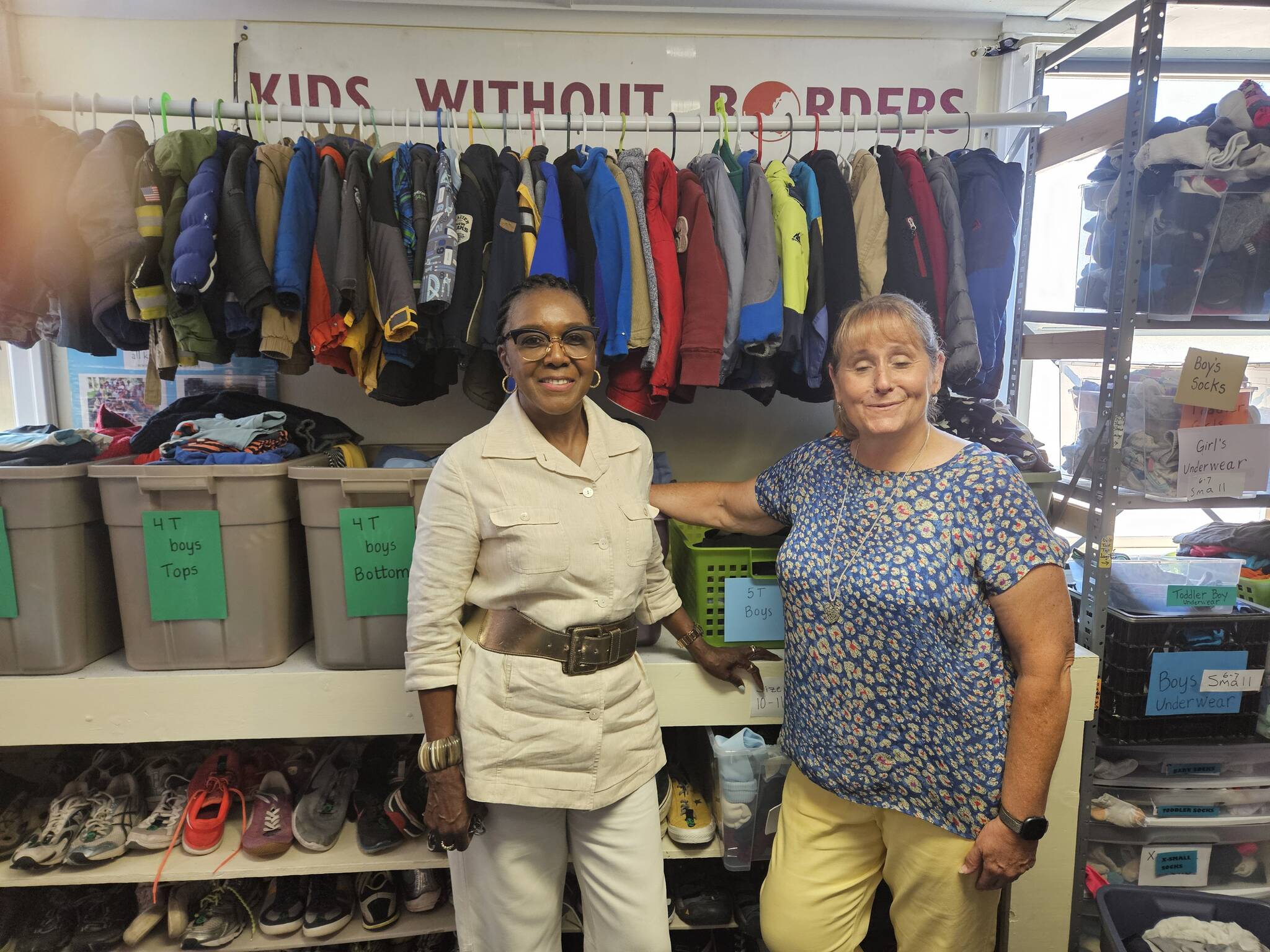Are you a Mercer Island kid who ever lost anything at elementary or middle school? Or maybe at the Stroum Jewish Community Center? If so, it probably ended up in one of their big “Lost and Found” piles.
But today you’ll be amazed to know that your favorite shirt, sweater, jacket, swimsuit, shoes — or maybe your backpack, water bottle, towel, or toy — are having a second life.
Your lost clothes or other possessions will soon be worn or used by kids from Afghanistan, Angola, Burma, Congo, Guatemala, Iran, Iraq, Nepal, Somalia, Syria, Venezuela or some other faraway country.
How did your stuff get to those kids? Here’s how.
The Rotary Club of Mercer Island (mirotary.org) collaborated with the Stroum Jewish Community Center (sjcc.org) and the Mercer Island School District (mercerislandschools.org) to collect all the Lost and Found stuff that kids forgot and left behind over the past few weeks as school let out and summer camps ended.
Several Rotarians — led by immediate past president Novelett Cotter, current president Benson Wong, president-elect Todd White, former president Pat Turner, and yours truly — first picked up about 10 bags of clothes from the “J” that we divvied up and took home to be washed, dried, folded and categorized. Then Pat suggested we ask if the Mercer Island schools had any Lost and Found stuff.
Superintendent Fred Rundle, also an MI Rotary member, arranged to have us pick up a dozen or so more bags gathered from elementary and middle schools. Some individual Rotarians added stuff that their children or grandchildren were no longer wearing. After a few trips, my garage was the repository of nearly 50 large bags and boxes. In addition to lots of clothing, we had toys, water bottles, sheets, towels, sleeping bags and other items – all in perfectly good condition.
But where to take it? Who might need it the most?
Novelett learned that the Tukwila Rotary Club supported a Children’s Clothing Bank and worked to help families who need kids’ clothes and other basic supplies. Many refugees or asylum seekers arrive with almost nothing, maybe just the clothes on their backs.
Katrina Dohn of Tukwila Rotary, who helped start their clothing bank about 20 years ago, was happy to hear of our efforts and arranged a day and time for us to deliver everything to Tukwila.
So on Aug. 1, we took three SUVs packed with bags and boxes and caravanned down I-5 to Tukwila. Todd drove his big SUV while Novelett and Benson drove theirs. We met Katrina and several of her fellow Rotarians at Fire Station #52, which had been sitting empty after a new station was built and turned over to Tukwila Rotary.
We were all blown away by what we found. The old fire station was already half full of donated clothing, toys, bikes and other stuff. Rotary volunteers were building new wooden shelves to categorized the donated items (girls/boys/large/small, etc.).
In one room, we saw dozens of boxes of brand-new tennis shoes that had been donated by a company called Trailer Source in Orting, Washington. The company donated nearly 5,000 pairs of shoes, about half of which had already been given away. One Rotarian told us that some immigrants had lined up on a cold rainy day to get new shoes because they had only flip-flops on their feet.
The Tukwila School District, we were told, is among the most diverse in the country, with about 80% of its students from immigrant families. Many have fled their countries seeking asylum because they have been persecuted. Others just want a better life. The American Dream still exists, after all.
“Whenever there is turmoil anywhere in the world, we see the results in about three months,” as a new influx of refugees shows up, Dohn said. Tukwila has long been a magnet city for immigrants, she added, with a long tradition of helping newcomers.
What’s different about Tukwila? A Brookings Institution study asked that question several years ago and concluded that it’s just a deeply compassionate community with a long tradition of helping others.
We also toured the Tukwila Food Pantry, Response Center and Tiny Homes Village, where families are fed, housed and clothed in a large facility staffed by volunteers at Riverton Park United Methodist Church. The International Rescue Committee helps support it along with several other nonprofit organizations. Nearby are numerous affordable apartment complexes where families can live while they seek stability, education, and jobs. A grocery store is within walking distance, and many ethnic shops have opened up all around the neighborhood.
Amazingly, we learned another fact that helps connect Mercer Island to Tukwila: MI City Manager Jessi Bon grew up just down the street and went to elementary school there. Hey, Jessi, we drove past your old house! So Mercer Island and Tukwila now have another great reason to stay connected.
–
John Hamer is a former Seattle Times columnist and editorial writer who has lived on Mercer Island for 25 years.



